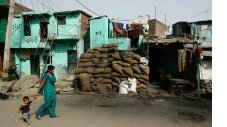Feedback/Comments from Our Readers
|
 Comments, questions and feedback is always welcome. Comments, questions and feedback is always welcome.
|
|
Global Health Rounds - April 9, 2018
|
We're always looking for new speakers and ideas for topics for Global Health Rounds for the new coming up academic year in the Fall 2018. If you have speakers or topics, please contact Cheryl Knowles at GHFoMD@ualberta.ca.
|
|
In Uganda, women with heart disease shown to take great risks to have a family
|
 Some Ugandan women are knowingly risking their lives in order to have children, a new study has found. Thousands of women in the East African country suffer from rheumatic heart disease, which has been largely eradicated in the developed world but is common in developing countries.
Women with the disease who become pregnant can suffer many complications, including blood clots, arrhythmias, heart failure and death. And those who take blood-thinning medications can risk having children born with birth defects.
Yet the cultural imperative to bear children is so powerful that these women are willing to take these risks in order to have a family, said Andrew Chang, MD, who is first author on a newly published study in PLOS ONE on the issue.
“We were shocked how casually individuals would state, ‘A woman who cannot have children is not a woman at all,’” Chang said.
|
|
India can’t eliminate tuberculosis by 2025 without curbing smoking
|
 More people die of tuberculosis (TB) in India than anywhere else in the world.
In 2016 alone, an estimated 423,000 Indians lost their lives to the infectious disease, accounting for nearly a third of global TB-related deaths, says the World Health Organisation’s 2017 global tuberculosis report (pdf).
There are a number of reasons for this, but the Indian government is going all out to target the main problems, notably delayed diagnosis and poor treatment. On March 13, prime minister Narendra Modi launched the TB-free India campaign, promising to eliminate the disease by 2025, five years sooner than the global target.
For this, however, his government will have to step up its efforts against one of the biggest causes of TB-related deaths in the country: tobacco use.
In India, 7.9% of TB-related deaths are caused by tobacco, according to new data from The Tobacco Atlas, a partnership between the American Cancer Society and the non-profit Vital Strategies, which measures the tobacco epidemic and its effects around the world. While India trails countries such as Russia (19.6%), Bangladesh (16.8%), and China (14.4%) in tobacco-related TB deaths, cigarettes and other tobacco products compound the problem in the country.
|
|
On the meaning of global health and the role of global health journals
|
Whenever I hear the term ‘tropical medicine’ or see it in print, what often comes to mind is, ‘how delightfully quaint!’ Quaint because it is dated, reminiscent of the colonial origins of global health. And delightful because it brings to mind how unremarkable it has become to recognize that global solidarity is necessary for health; that ‘we're in this together’. Global health did not begin that way. Indeed, my first challenge 2 years ago when I was appointed the inaugural Editor in Chief of BMJ Global Health was how tricky it was to define global health. It is an ongoing struggle. In this editorial I describe where I am on that journey and how a well-considered meaning of global health could transform global health practice, research and journals.
To define the remit of the journal, I had to first define global health—what should qualify as a global health paper and what should be the markers of quality of a global health paper. I recalled a BMJ blog with a set of caricature definitions of four eras in the history of global health1: global health 1.0 as tropical medicine, beginning as an effort to keep white people and subsequently the labour force alive in the colonial tropics; global health 2.0 as international health, which was about clever people in high-income countries (HICs) helping people in low- and middle-income countries (LMICs); global health 3.0, which is (note the change in tense) about people from HICs leading health programmes in LMICs; and global health 4.0, which is about people from LMICs leading health programmes in LMICs.
To read more about this article go to https://academic.oup.com
|
|
Eradicating poverty would dramatically reduce TB cases, study finds
|
 Programmes to tackle poverty could be just as effective in the fight against tuberculosis as medicines and vaccines, research has found.
Eradicating extreme poverty would lead to an 84% reduction in TB cases by 2035, according to a report published to coincide with World Tuberculosis Day on Saturday.
Nine scientists and policymakers carried out research examining incidences of TB across 192 countries for a study that appears in Lancet Global Health.
The conclusions were reached by looking at the links between people living on less than $1.90 a day and the coverage of various social programmes in each country. Researchers then related this to the current levels of TB, projecting the associations forward 20 years.
More than 95% of deaths from TB occur in low- and middle-income countries, so the association between poverty and TB are well established. However, researchers say the latest findings are significant in providing new evidence of the links.
To read more about this article go to https://www.theguardian.com
|
|
Caring for the chronically ill in Bangladesh’s Rohingya camps
|
 With her neck contorted and head tilting onto her left shoulder, 16-year-old Sanjida looks decidedly uncomfortable as she sits on a blue plastic chair by the door of her family's shelter in a refugee camp in southern Bangladesh. But the fact she is sitting up at all has everyone beaming.
After four years of increasing paralysis brought on by untreated meningitis, the Rohingya girl has recently regained some movement thanks to a pioneering programme to help people with life-threatening illnesses in the swelling refugee camps.
Sanjida is one of more than 671,000 Rohingya pushed into Bangladesh since last August by a violent military crackdown in Myanmar’s northern Rakhine State.
Along with the refugees, medical workers flooded into Cox’s Bazar. They treated traumatic injuries, raced to reverse severe malnutrition exacerbated by displacement and disease, and set up an emergency medical care system in the chaotic first weeks of the influx. But despite the scale of the response, healthcare advocates say thousands of people with incurable diseases are still ignored by a system that overlooks the needs of the dying or gravely ill.
|
|
|
|
Save the Dates of Local Events!
|
FINAL REMINDER THIS SATURDAY!!
Annual Rich Man Poor Man Dinner Event 2018
April 7, 2018
Time: 6:00 pm to 9:30 pm
|
|
Conferences, Symposiums & Lectures
|
Save this link to your favorites as I update it daily will all events, symposiums, etc., just click here.
=========================
Global Health & Innovation Conference
April 14-15, 2018
Yale University
New Haven, CT
|
|
Call for Abstracts/Submissions
|
Global Health & Innovation Conference at Yale on
April 14-15, 2018
is calling for abstracts.
|
|
Newsletter & Special Journal Editions
|
|
|